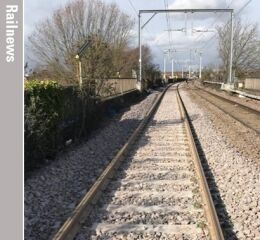Posted 8th March 2024 | 3 Comments
Railway ‘not good enough’, says National Audit Office

The Labour Party has criticised delays to rail reforms which have been highlighted in a new report from the National Audit Office, and has repeated its pledge to fully renationalise the remaining private sector passenger operators if it is elected.
The NAO has concluded that the railway’s performance ‘is not good enough and has not been for some time’.
It points out that the Department for Transport knows what the problems are, but has not been able to use this knowledge effectively, and that the level of railway subsidies is ‘unsustainable’.
A further problem has been that ‘the government’s legislative priorities have changed’, and this lack of consistency has also made things more dfficult for the DfT, as when a new Act to reform the railways was postponed.
Although a draft Rail Reform Bill has now been published, the NAO warns that key reforms are now postponed until the next session of Parliament. This is unlikely to take place before the next General Election, while the ‘DfT is not yet set up to secure value for money from its work to reform rail’.
New data from the Office of Rail and Road has revealed that cancellations were at 4.9 per cent between October and December last year, which was the highest level since these figures were first recorded, ten years ago.
Labour’s shadow transport secretary Louise Haigh said: ‘It is clear that under the Conservatives our rail services are being run into the ground. Cancellations are soaring, fewer and fewer trains are turning up on time, and fares have once again been hiked, leaving long-suffering commuters literally paying more for less.
’Under the Tories rail reform has stalled and we are on a train to nowhere. Labour will end this cycle of failure by bringing rail franchises back into public ownership as contracts expire, and putting passengers at the heart of every decision.’
The DfT responded: ‘The £3.1 billion of subsidies the NAO refers to are a result of external pressures, including the challenges of post-Covid passenger recovery, not related to rail reform savings.
‘We have laid out a clear plan for the industry’s future under Great British Railways in our recently published draft bill and we are now pressing ahead with improvements that will benefit millions of customers like expanding Pay As You Go ticketing, piloting simpler fares, and announcing a target for rail freight growth.’
Reader Comments:
Views expressed in submitted comments are that of the author, and not necessarily shared by Railnews.

david C smith, Bletchley
I guess one reason BR had relative success in the 1980's stemmed from the comparison being with other State railways in Europe. Many of these nowadays have evolved further, with private operators sharing the infrastructure ; in Spain, for example the high speed network is host to three or four competing operators. My contention is that a uniformly privatised railway , and similarly uniform nationalisation both suffer from trying to impose a single model on a diverse variety of activities, and might be more efficient / effective with a "horses for courses" approach.
david C smith, Bletchley
Do we really want renationalisation ? I'm not convinced, for one ; the former BR was not notable for being a great success story*. Our economy works largely on a market capitalist basis, so that a government controlled monopoly is unlikely to "fit well". But don't assume that another attempt at a privatised railway will automatically "work" without careful thought, especially the possibillities stemming from structuring subsidies as incentivisors, which take into account "hidden" costs and benefits. Design and implementation of a superstructure of these could be the best way for government to achieve its aims.
[In the later 1980s BR was the most efficient railway in Europe, needing less subsidy than the franchises after privatisation.--Ed.]
Christopher Jones-Bridger, Buckley Flintshire
The rail industry has been plagued by inertia & indecision from government ministers for years. The Williams report, part hijacked by then transport sec Shapps, clearly identified the dysfunctional structure that had originally been created by the 1993 Railways Act that led to privatisation as being financially inefficient. The creation of GBR was seen as key to restoring some degree of integration that would eliminate the bureaucratic barriers in the industry that are costly & totally unproductive it's efficient functioning.
Unfortunately the remedy prescribed to unlock the industry's financial woes has proved a bitter pill to swallow to the free market fixated conservative ministers charged with administering it. The result, rather than to get on with creating the legislation in a timely fashion, they have prevaricate leading to costly delay ensuring there will be no significant change this side of the general election with the industry suffering accordingly.
Ever since the PM unilaterally chose to cancel HS2 phase 2, seemingly preferring the advice of aides & special advisors rather that seasoned transport professionals, the thrust of government transport policy has shifted further towards road rather than public transport investment. Also for years the transport ministry has been populated by a revolving door of ministers with no particular interest in transport only seeing the role only stepping stone in the trajectory their own careers either rising or sinking. This has inevitably lead to deferred decision making. This has only been too apparent in the last few years when recovery from the covid pandemic has been hampered by knee jerk responses to the short term financial pressures. Instead of decisive leadership with a clear strategic vision we have been lumbered with spreadsheet gazing petty minded bean counters.